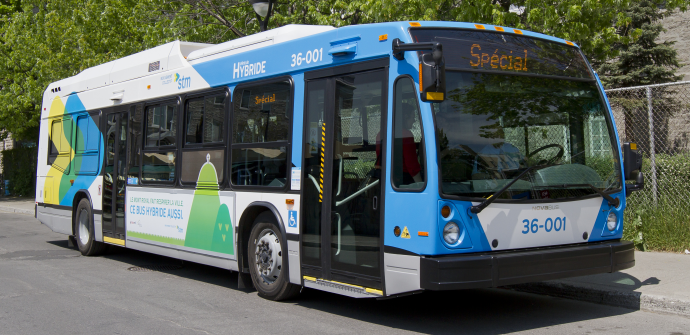Following the publication of some articles with erroneous claims about the reliability and energy performance of hybrid buses, the STM wishes to rectify certain statements.
Following the publication of some articles with erroneous claims about the reliability and energy performance of hybrid buses, the STM wishes to rectify certain statements.
Summary
- Hybrid technology is currently the best choice.
- STM currently has 266 hybrid buses and 300 additional buses will be added in 2020.
- The ecological benefits of these vehicles are proven: reduction of GHG emissions and fuel consumption.
- Since the end of 2018, hybrid buses are more reliable than the average of the STM fleet.
- The Hong Kong study cannot be generalized to Montreal.
- Hybrid buses are the best option for renewing the fleet, increasing service offerings and ridership, and transitioning to the electrification of the surface network.
- Currently, widespread acquisition of electric buses would be premature and require even more vehicles to provide the same service. In addition, we would need to make major adaptations to our bus garages and routes, depending on the type of technology chosen.
- It would not have been possible to accommodate 300 new electric buses in 2020.
The Hong Kong study cannot be applied in Montreal
- Contrary to what has been reported, the findings of this study cannot be considered for Montreal
- Hong Kong's hybrid buses are completely different:
- Double-decker buses
- no recovery of energy from braking like on our buses
- The conditions in which Hong Kong buses are used are also completely different:
- Hong Kong climate very warm year round
- No heating
- The city of Hong Kong is very hilly
- For Montreal hybrid buses, the latest measurements show that there are indeed significant fuel savings and therefore fewer GHG emissions.
- Not surprisingly, the lower the average (or operating) speed, the greater the savings due to the energy recovered during braking.
Fuels savings are real and measured
- Depending on the season and average bus speed, the reduction of fuel consumption and GHG emissions can reach 30% and under the worst conditions, 8%.
- This is consistent with a study on first generation hybrid buses that we conducted in 2009 with the Société de transport de l’Outaouais, the Ministère des Transports of Quebec and Transports Canada (http://www.sto.ca/ligneverte/_download/depliant_phybride_2_1.pdf).
- Even in cold weather, the fuel consumption of hybrid buses is better than biodiesel buses.
- Only our hybrid buses are air conditioned, which affects consumption.
- Although the STM has successfully reduced consumption by 40% on biodiesel buses since 2005, hybrid buses are still more efficient.
Hybrid buses are more reliable than the average of our fleet
- It is not true that hybrid buses are less reliable: it is rather the opposite.
- Hybrid bus reliability, which is measured by the mean distance between failures (MDBF) indicator used worldwide, has seen a significant increase in the past 12 months.
- Hybrid buses have been 36% more reliable than the average of our fleet since the end of 2018.
Additional documentation

